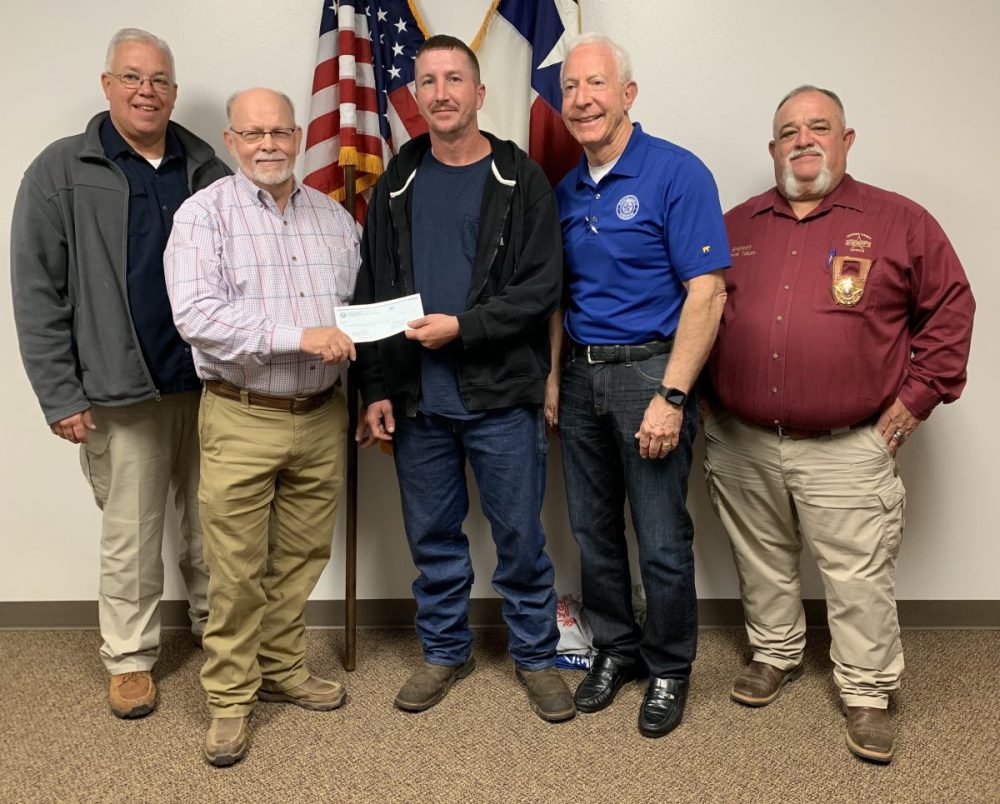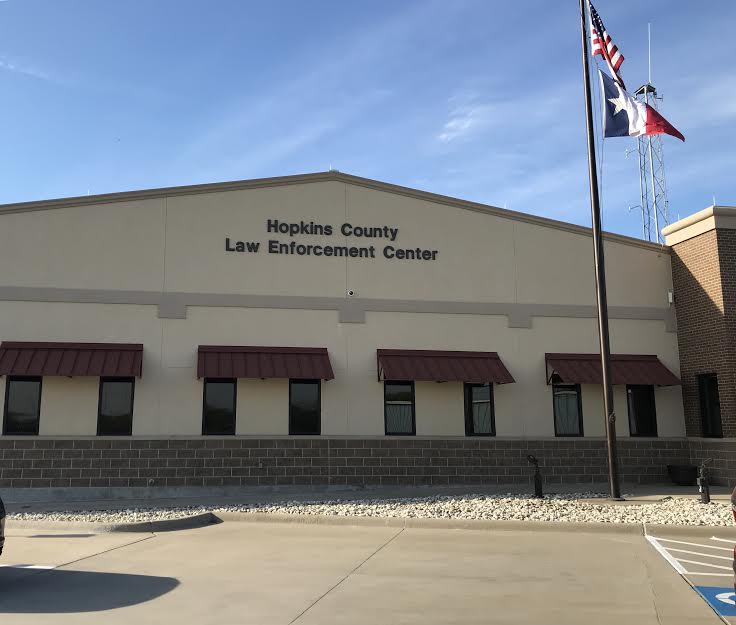When Brandon Flanery received his paycheck Thursday, it not only marked his first pay as a Precinct 4 employee, but another successful step in his life and a sheriff’s office program.
Flanery is the first person to benefit from Work Force Solutions Grant funding awarded in Hopkins County. The organization received $150,000 to distributed in the agency’s nine-county region.
“Of the nine counties, Kenneth [Dean, jail administrator] and I were told at a meeting, we seem to be the most interested in using this grant and seeing this go forward,” said Hopkins County Judge Robert Newsom.
The Work Force grant will pay half of Flanery’s salary, up to 488 hours, according to Precinct 4 Commissioner Joe Price.

The grant is awarded to help individuals transitioning to the work force after being release from jail. Flanery served from Dec. 28, 2018 to Nov. 12, 2019, in Hopkins County jail, according to jail reports.
Over the last 10 1/2 months, Flanery was among the individuals selected to participate in a Trustee Work Program, part of an overall inmate re-integration program being implemented in phases through Hopkins County jail.
Inmates, after being booked into Hopkins County jail, are vetted over a series of days by jail administrator Kenneth Dean. Those inmates who truly display a desire to change their lives and who are thought to pose low risk to the community are selected to perform work tasks in the community, the jail administrator and sheriff explained.
“If you don’t want to change then it aint no good to even try. You’ve got to want to,” Flanery said.
“Brandon, he showed a change, where he wanted to change. I think that’s important. They’ve got to want what they’re getting in order to be successful. Brandon really showed that change,” said Kenneth Dean, HCSO jail administrator.
The inmates not only provide valuable labor by performing community service work at a cost savings, but also are learning valuable skills which can translate to the work force upon their release from jail.
The county commissioners began utilizing jail trusties on their precinct crews in March, with two inmates working daily, sometimes more if additional help is needed for a big project. Flanery was one of the first inmates selected through the Trustee Work Program for a road crew.
“He’s actually been working for us for about 7 months for free, and learning while he was there,” Price said, noting the heavy equipment operations, use of backhoe and dump truck, and other skills Flanery received training in as part of the Trustees Work Program.
Flanery also received a CDL book to study as part of the job program, and plans to look it over and, in the near future, apply for his commercial driver’s license as well.
“He really dug in and was successful and made a good hand for Precinct 4,” Dean said.
“I learned a lot,” Flanery noted. “I learned how to operate. I’m learning how to weld right now.”
Price said the inmates have often been commended by community members for the work they do working on the county road crews.
Upon Flanery’s release from jail last week, Price was able to hire 36-year-old for an open position on his precinct crew. Thursday, Flanery received his first paycheck for his work.
“It feels good to be on this side,” Flanery said, during an interview Thursday in which Dean and Hopkins County Sheriff Lewis Tatum were both present. “Usually, I’d be nervous right now being around a sheriff. It’s a good feeling to be on the right side of the law.”
Flanery said the work isn’t something he’d considered pursing in the past, but is something he can definitely see himself continuing in the future.
Inmates have helped out at the Civic Center and a few other locations for years, but the jail’s inmate work program has really expanded over the last three years, offering training with various other agencies and locations. Inmates even have a farm on which they grow vegetables and raise livestock to help feed those housed at jail. In addition to the county, inmates also perform regular work for Sulphur Springs ISD and are now expanding to the city as well, according to Tatum.
Flanery is the third individual who has been hired by the county as a result of the Trustee Work Program, but is the first individual to be employed by Price and the first to benefit from the Work Force grant, according to Hopkins County Sheriff Lewis Tatum.
“It’s good. It’s helped. I got a job,” Flanery said when asked about the program. “It’s a good program.”
Flanery said the Trustee Work Program wasn’t the only thing at the jail that helped him change his life.
“Going to church helped out a lot, more than a lot,” Flanery said.
He said church was not part of his life prior to being arrested last December, but became part of life.
“We have a lot of ministry in the jail that we provide. We feel like, and the sheriff’s a firm believer, we offer this stuff to them to make them better. We can expose them to it. When they decide to make that change, they’ve got the tools in front of them to make them successful. They have to want it,” Dean said.
Ministry opportunities are made available 6 days a week for inmates at the county jail, along with other programs, such as GED classes for those who have not earned a diploma.
“We hope that Brandon is the first of many who will be successful, not only through the programs within our sheriff’s office but also through the Texas Work Force grant,” Newsom said.
Tatum, Newsom, Price and Dean expressed a desire to be able to offer more tools to better help individuals released from jail in Hopkins County reintegrate into the community. One thing they’d like to do is offer more training and work opportunities through the Trustee Work Program. Another is find resources to provide more stability, a transitional house where individuals who do not have somewhere to go when release from jail can stay for a month or two, so they can get back on their feet.
“At some places, there are churches that actually get involved in these type of houses. I think it’d be great if we could have that here,” Price said.
Transitional housing would help in a number of ways. Many individuals, once released from jail have very few resources, including housing, funding and jobs. Finding housing for a person who has recently been in jail, especially a person convicted of a felony offense, can be difficult as some will not rent to a convicted felony. A transitional house would give individuals a stable place to live, if short term, upon their release from jail. While staying there, they would be able to save up some money for a deposit and rent, and other basic items needed, the officials pointed out.
“With the transition housing, it takes a good three to four months for them to get on their feet, to get paychecks in before they can really sustain themselves out there,” Dean said. “Coming out as a convicted or, whatever they come out as, people are reluctant to rent. But once they get that time and get established, I think it’s going to benefit everybody.”
“Having a job is everything, because without a job, nobody wants to rent to you or sell you a car or anything like that,” Newsom noted. “It’s transition. It’s not half-way. It’s not for 6 months. It’s for a month to two months back. They’ve got to stand up on their own feet. One of the secrets of this whole program is becoming able to become self sufficient.
“It’s a big change. It’s scary, starting from the bottom,” Flanery acknowledge, but indicated he is committed to doing well.
“If there’s some way in the future, whether I’m the sheriff or not, if there’s some way we could help these guys get on their feet with a residence for a couple of months, that’d be great. We all know how hard it is starting out. It’s tough,” Tatum said.
“Another goal of the future is reaching out to some of these industries in the future and asking if they’d commit to hiring so many, that way, we’d know some places where they can look for work. We do all this because it’s a savings to the county. People don’t realize that. If you can keep that person out of jail and working in our community, we’ve saved some tax dollars,” Dean said.
Transportation is another issue for individuals upon exiting jail. They need a way to get to and from work, said Dean.
“If we could find someone, maybe a car dealership, that could find some old used cars, nothing fancy but that would get them back and forth to work, that’d help,” Dean said.
The sheriff said there many potential opportunities to consider to expand the reintegration program, and welcomes discussion and help from community partners interested benefiting change lives of these individuals.







